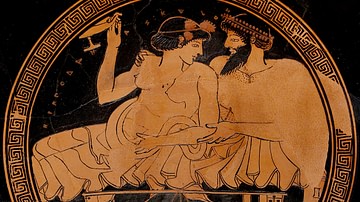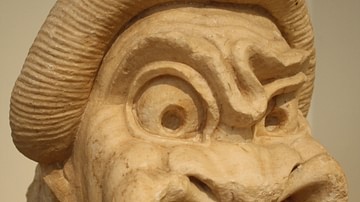
The symposium (or symposion) was an important part of ancient Greek culture from the 7th century BCE and was a party held in a private home where Greek males gathered to drink, eat and sing together. Various topics were also discussed such as philosophy, politics, poetry and the issues of the day. The symposium is widely referenced in Greek literature, theatre and the visual arts, particularly pottery decoration.
The symposium was open only to Greek males and the only women permitted were the hetairai - high class prostitutes trained in music (especially the aulos or flute), dance, gymnastics and high culture. The activity was primarily enjoyed by the highest class of Greek society, the aristoi. As such, symposia helped to reinforce the shared status and cultural bond held between the elite of the polis or city-state.
The participants or symposiasts gathered in the private home of one of the group and reclined on couches in a specially devoted room - the andrōn. The cushioned couches numbered between seven and eleven and were arranged around the walls of the room so that all participants could see each other, sometimes with the evening's president being chosen by lot. It seems that the formality of the occasion varied, some were formal philosophical discussions whilst other symposia seem to have been nothing more than drinking-bouts.
After eating and drinking and the pouring of libations, the guests might play games, listen to and perform music (especially the lyre), tell each other stories, give each other advice on daily problems, discuss politics and enjoy each other's company. Poetry recital was a common element, particularly works by the lyric poets Alkaios, Anakreon, Archilochos and Theognis. Guests were also encouraged to show off their own poetic and intellectual skills with off the cuff recitals and repartee. Drinking continued throughout the evening, usually through the passing around of a shared cup or kylix. Singing of songs was also popular, for example, the skolia - songs performed by each symposiast in succession (going around the room in the customary anti-clockwise direction) - and silloi - satirical and comic songs. On occasion, the group of revellers (komos) even went out into the streets to continue their singing and dancing, no doubt to the annoyance of the neighbours.

The symposium was a popular setting in Greek literature and theatre. Aristophanes' plays the Wasps and Lysistrata both include symposia scenes. Plato devoted a whole dialogue to the practice in his Symposium which is set in 416 BCE. Here the historical characters of Socrates, Aristophanes, Agathon and Alcibiades, amongst others, meet to celebrate the release of Agathon's successful play and end up discussing the meaning of love, doing so until dawn. Socrates concludes that the highest form of love is the love of true beauty, that is the ideal essence of beauty, the unchanging and perfect Form of beauty. We also learn something of the procedures of a symposium; we are told the characters 'follow the whole ritual'. First, Socrates dresses up for the occasion and puts on a pair of fancy sandals which is indicative of the social importance of a symposium. In the home of Agathon, the group reclines on couches and first dines. Then they pour a libation to the gods, then sing a hymn and finally settle down to drinking wine, launching into a juicy topic of discussion.
In addition to Symposium, Plato also endorses the benefits of the symposium as an activity in his Laws as a means to test and promote virtue in citizens. Xenophon wrote a Socratic dialogue (set in 421 BCE) also titled Symposium in which Socrates and others discuss the object of their greatest pride.
On Greek red and black-figure pottery, scenes from symposia were very popular, especially on the kylix or stemmed cup. These were an obvious choice as they were used for drinking wine at symposia. Their purposely designed stemmed foot and horizontal handles meant that they could be easily lifted from the floor when reclining on a couch.





